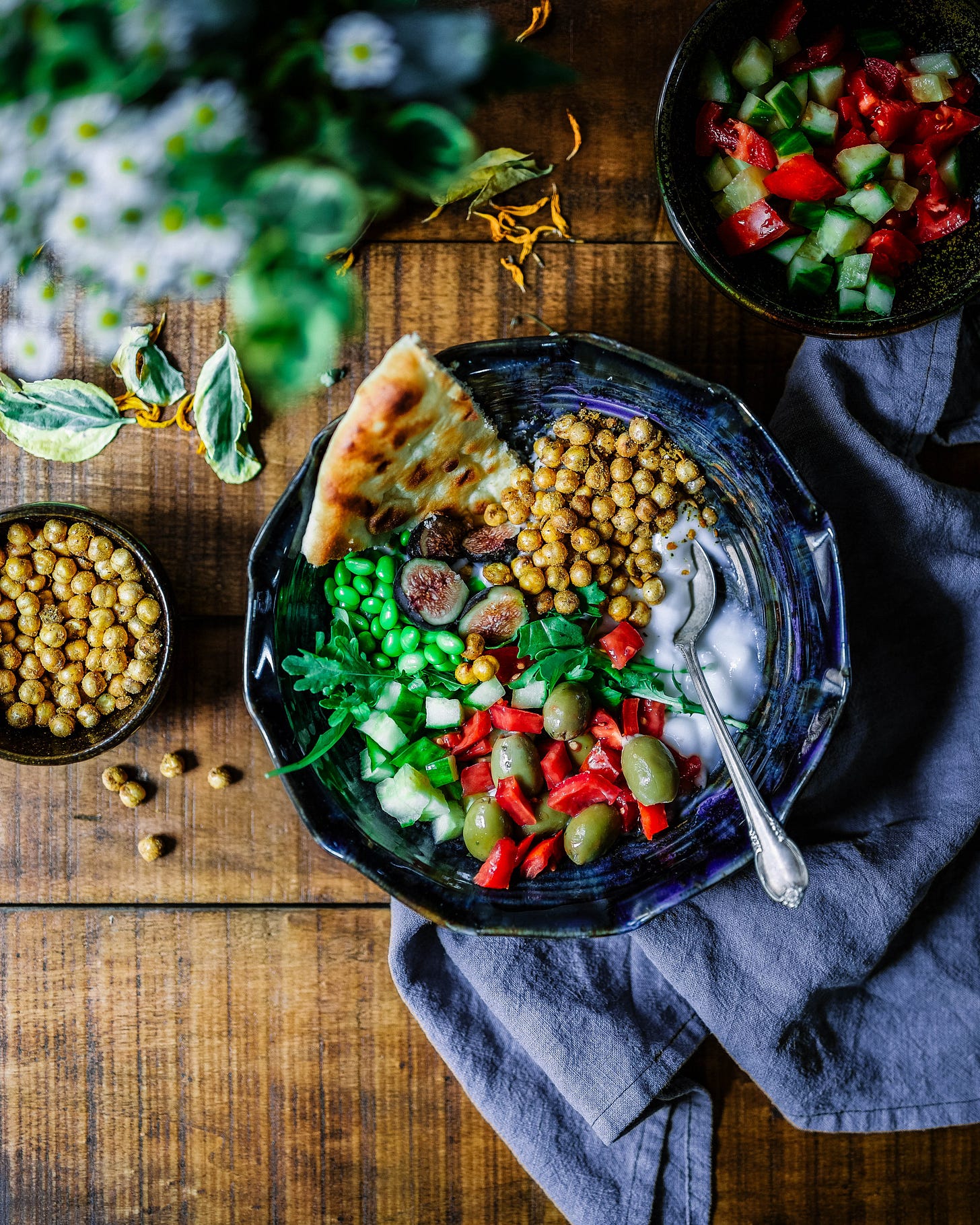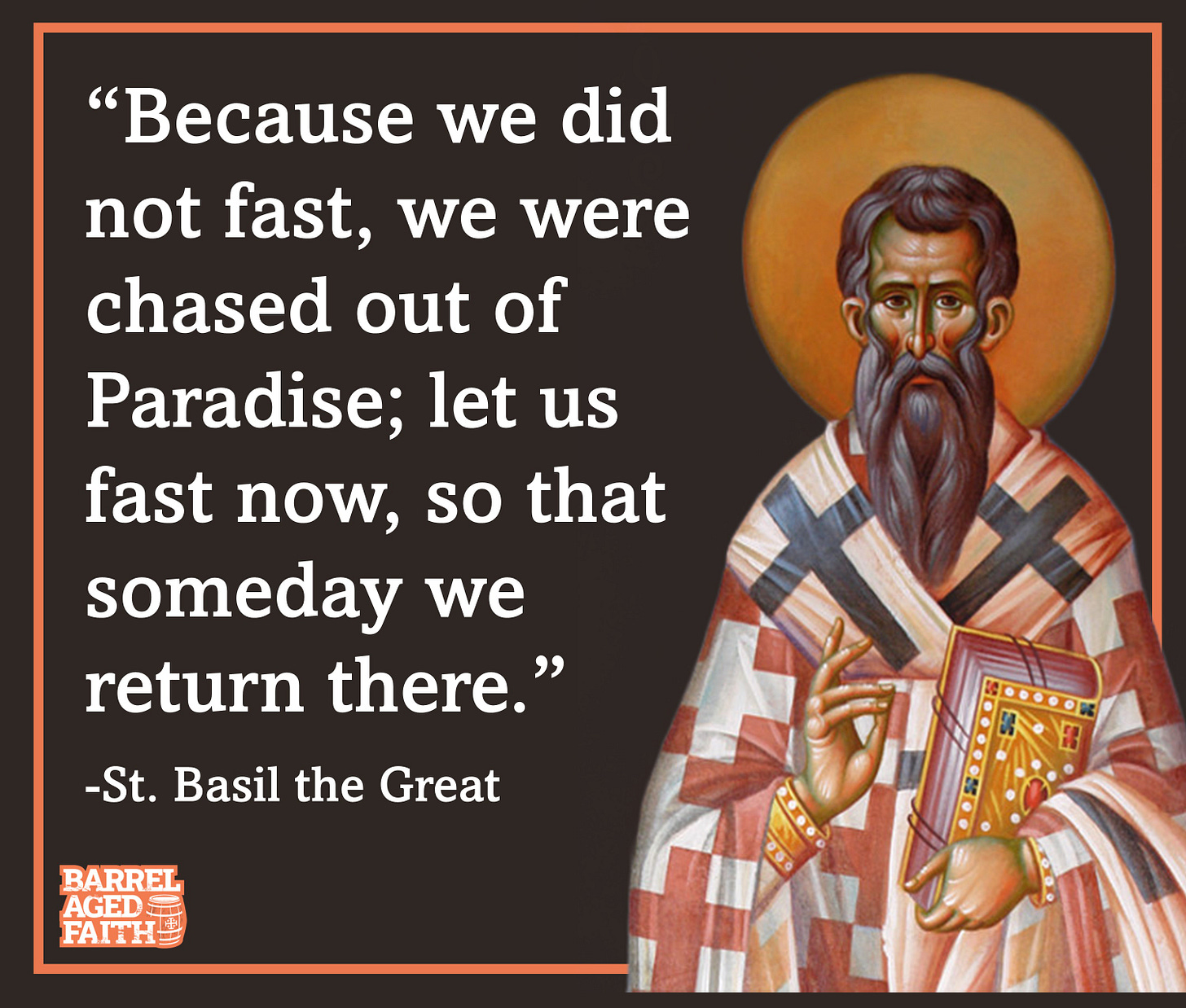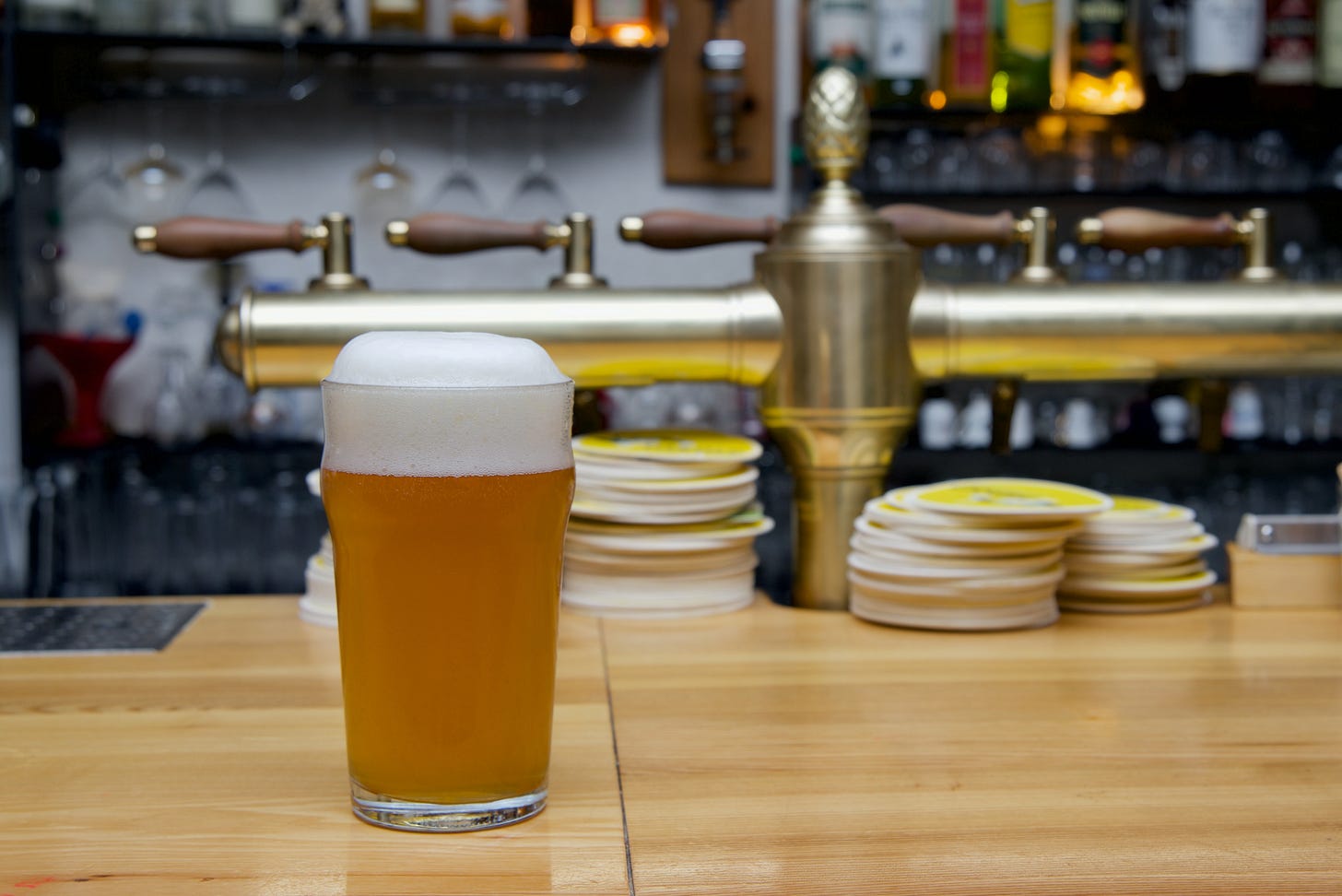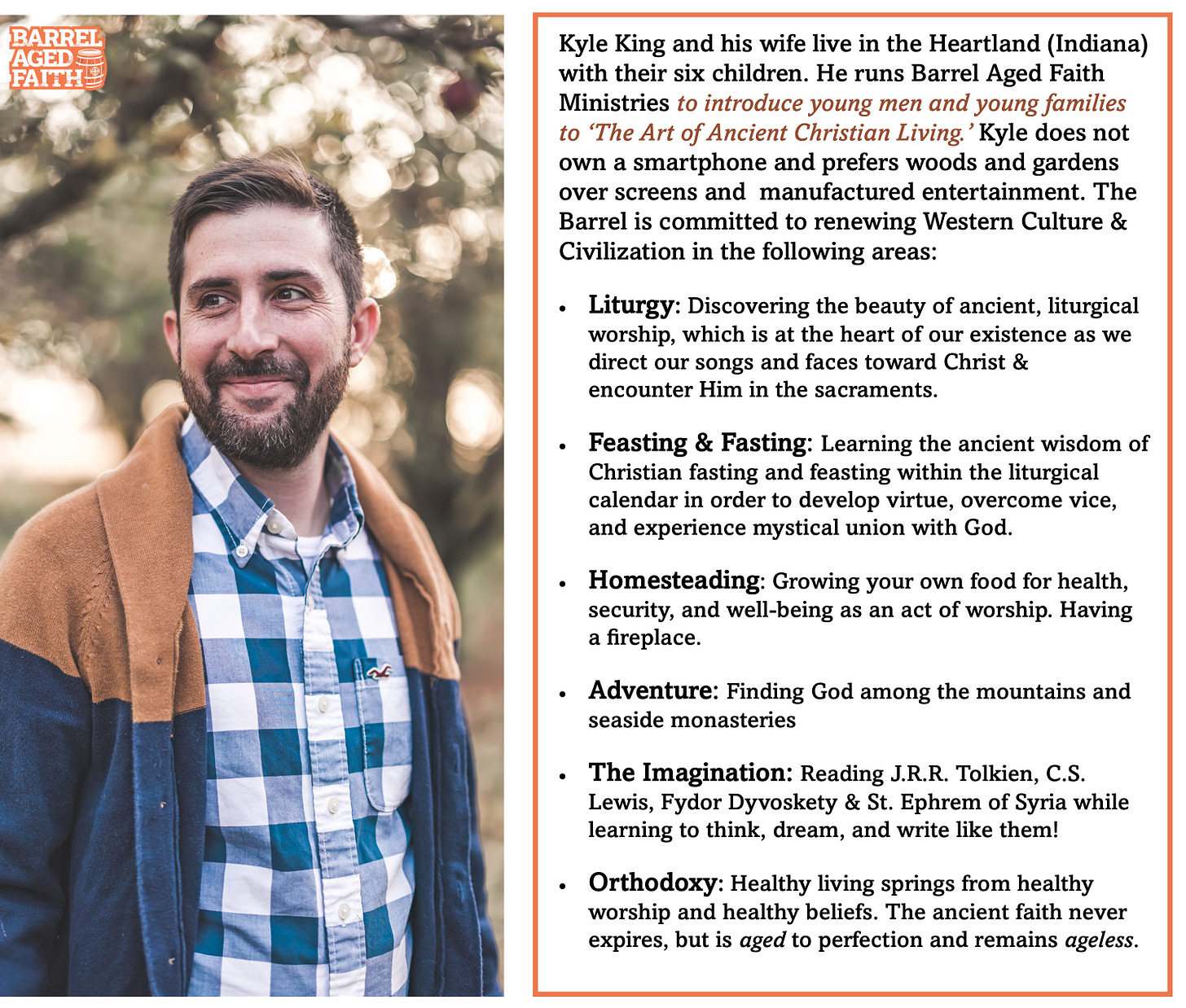Roasted Chickpeas & Fasting on Fridays
Discovering the Wisdom & Joy of Ancient Christian Fasting (Ancient Christian Living)
“Because we did not fast, we were chased out of Paradise; let us fast now, so that someday we return there.” - St. Basil the Great
“To deny oneself that one may follow Christ. To chastise the body. Not to embrace delights. To love fasting.” - St. Benedict of Nursia
Roasted chickpeas have become my bread and butter over the last few years! I air fry them in our oven at 425 degrees for 15 minutes with olive oil, sea salt, a little garlic. There are other ways to roast them without an air fryer. They are a great replacement for meat or carbs in your diet (during times of fasting from meat such as Fridays), and they are also great with roasted chicken and pork as well (during times of great feasting like Christmas and Easter). Give them a try!
Since I follow the ancient Christian fasting program (still followed by Eastern Christians today & a growing number of Western Christians today), I do not eat meat on Wednesdays and Fridays throughout the year nor the four main seasons of repentance and preparation (Lent, Advent, Apostles’ Fast, & Dormition Fast, etc). Fasting from meat and waiting to eat until noon (or 3pm or later) is a great way to control our obsessions with food and allow God to become the true master of our souls. The church fathers are very clear that if you give God control over the good things in your life (our food, our life plans, our entertainment, our jobs, our kids), it is much easier to fight the good fight against temptations to sin. (If you can say 'no' to food during good times, then you can fortify your faith to say 'no' to sin during difficult times).
For St. Basil, the first sin was committed, because Adam and Eve refused to fast. God made them in His Divine Image to not only create and cultivate the Garden like he did, but to also master the Garden and ultimately, their own desires. If Adam and Eve were to grow in their glory and ascend up the Holy Mountain (Eden) to commune with God into deeper intimacy, then they had to control their desires and master them. Instead, they were overwhelmed by them and descended deeper into their animal instincts.
Most sins are choosing ‘the lesser good’ over ‘the greater good.’ It is not wrong to go to the pub and have an ale, but it is wrong to go to the pub and have so many ales that you lose control over your God-given faculties. The ale controls you rather than the other way around.
It is not just the desire for food or ale that can be our downfall. It can also be other good desires such as the desire for perfection. In Middle Earth (The Lord of the Rings), the Dark Lord Sauron was actually created good, but became a perfectionist, and although it is not wrong to create quality work, he began imposing this perfection on others in a manipulative way. He fell from the good by seeking the good in the wrong way and by allowing his desires to sweep him away. There would have been no Dark Lord if he had learned the art of fasting and had become the master of his desires rather than the other way around!
Once we are aware of how sin works in us, we immediately begin to see the wisdom of fasting with prayer. Fasting ‘resets’ our compass so it points north. It purifies the soul when combined with prayer so our minds and hearts are directed toward heaven and the Kingdom of God rather than toward our stomachs or the kingdom below.
To see how seriously the saints, doctors, and fathers took fasting, read the following quotes:
“What can be more powerful than a fast? By its observance we draw near to God, and withstanding the devil, we conquer our alluring sins. For fasting has ever been the nourishment of virtue. From abstinence indeed proceed pure thoughts, prudent wishes, more healthful counsels: and through voluntary afflictions, the flesh dies to its concupiscences, and the spirit is renewed in virtue.” -St. Leo the Great (5th century)
“Let not your fasting be with the hypocrites, for they fast on the second and the fifth day of the week; but keep your fast on the fourth (Wednesday) and on the preparation day (Friday).” -Didache, Teaching of the Apostles (1st Century)
“Wednesday and Friday is not to be broken unless there is great necessity.” -St. Jerome (5th century)
“On Wednesday because on this day the council of the Jews was gathered to betray our Lord; on Friday because on this day He suffered death for our salvation.” -St. Peter of Alexandria (4th century)
“We abstain from flesh meat and from all things that come from flesh, as milk, cheese, eggs.” -Pope St. Gregory the Great (6th century)
“Our fast at any other time is voluntary; but during Lent, we sin if we do not fast.” -St. Augustine (5th century)
“There is no island, no continent, no city or nation, no distant corner of the globe, where the proclamation of [the] Lenten fast is not listened to. Armies on the march and travelers on the road, sailors as well as merchants, all alike hear the announcement and receive it with joy. Let no man then separate himself from the number of fasters, in which every race of mankind, every period of life, every class of society is included.” -St. Basil the Great (4th century; Concerning the universality of Lent)
Although Western Christian fasting practices have drastically changed in the modern era, Pope Nicholas in the 9th century reveals that the West used to fast in nearly the same way as the Christian East. In describing the times of fasting, he writes,
“Namely during Lent, which is before Easter, on the fast before Pentecost, at passages in which we believe not without reason that not only a man but also a woman is blessed, who does not walk in the counsel of the impious and who fears the Lord… the fast before the assumption of the holy mother of God (a.k.a Dormition Fast before August 15th) and the ever virgin Mary, our Lady, as well as on the fast before the feast of the birth of our Lord Jesus Christ (Advent): these are the fasts which the holy Roman church received in antiquity and maintains.”
He then describes the importance of always fasting on Fridays while he views Wednesdays as more negotiable for newer Christians so the burden is not too great:
“But on the sixth day of every week (Fridays), and on all the vigils of famous feasts one should cease from eating meat and should apply oneself to fasting, so that one may truly be able to say with the writer of the Psalms: Weeping shall last the night, but in the morning shall come happiness. But if some wish to abstain from meat on other days, they should not be forbidden to do so, because the more tears someone sows in this life, the greater shall their harvest of joy be in the eternal life. Although one should engage in lamentation more on Wednesday than on the other days except Friday, because the Lord had already been buried in a certain way on this day in the heart of the earth, i.e. in the heart of the traitor Judas, when he was planning to betray Him to death, Nevertheless, we cannot impose this heavy yoke upon you (he is writing to new Christians and mission lands in Bulgaria) who are, as we have said, still rough and like children to be nourished with milk, until you come to solid food. Yet, just as we advise you of this for the time being, so we admonish you in every way that you not touch what has been forbidden; for by tasting a mere apple that was forbidden, the first formed people were expelled from the pleasantness of paradise. 16 if one of you wishes to eat meat on this day, he absolutely can, unless perchance it is known that this has been forbidden him by a priest.”





